Juan Carlos Lomónaco & The Symphony
There’s something rather exciting about dashing up the carpeted stairs of the Teatro José Peón Contreras in the middle of the afternoon, when no one else is around. The man at the door hears our credentials and lets us behind the velvet rope, and we feel special. There is no performance to attend… but the Yucatan Symphony Orchestra is rehearsing and we (Katalina McNulty and Working Gringa) are invited to observe the rehearsal, and afterwards, interview the new conductor and musical director, Juan Carlos Lomonarco.
We’ve attended a few performances of the Symphony (far too few, really…) and more performances elsewhere… but never a rehearsal. The stage and audience are both lit, and the musicians, usually in black formal dress, are decked out in various bright colors, looking like little bits of confetti from the back of the room. Luckily, we were given permission to sneak behind the stage to photograph the proceedings, and we caught a whiff of the greasepaint and the floorboards and the velvet curtains and the magic of theatre while we listened to them play. If you’ve ever been in a performance and spent time backstage, among the cables and stagelights and curtains, you know what we mean.
And then, of course, we were right there in the midst of the music. We were in close proximity to the precious instruments… the violins, the shining horns, the harp… all works of art in their own right. Writing and taking photographs are solitary artistic pursuits… at the most, we collaborate with one or two people in a tag team sort of way. But here we were, observing up close, the creation of art en masse, in an ensemble, everyone thinking and breathing and moving together. Seriously, it was breathtaking.
When we weren’t taking photographs or in a musical trance, we were mesmerized by the figure at the front of the stage, standing on a box and waving his hands, a Shakespeare play’s worth of expressions crossing his face in the space of minutes. Who hasn’t dreamed as a child of being a conductor? Waving a stick around and imagining that the music is created by each flick and turn of the wrist? What power the conductor wields! There was something so exciting about it as a child, and as an adult, watching, we realized the reality is not that far from the fantasy. Of course the musicians play from a score, but the conductor has a certain power to communicate and call forth an energy that the musicians would not express left to their own devices.
Juan Carlos Lomonarco was the man on the box in front of the orchestra that day, and he is the new director of the Sinfonica de Yucatán (Yucatan Symphony Orchestra). Not only is he a graduate of the famous Curtis Institute of Music in Philadelphia, but he founded and continues to direct the Ensemble Iberoamericano in Madrid, a Spanish musical ensemble that plays music of Mexican composers. He has also served as music director of the National Conservatory of Music’s Orchestra, assistant conductor in The National Symphony Orchestra of Mexico, as well as Music Director of the Carlos Chavez Symphony Orchestra, all in Mexico City. He has guest conducted all over the world, including in Serbia, Lima, Venezuela, Italy, Ecuador and several Mexican cities, to name just a few. He came to Merida early in 2009, but this upcoming 2009-2010 season will be the first that he has created, rehearsed, negotiated, promoted and directed.
In the last few months, he has been working closely with a new organization, FIGAROSY (Fideicomiso Garante de la Orquestra Sinfonica de Yucatán… creating a great acronym that SOUNDS like it’s all about classical music). The orchestra was previously administered by ICY (Institut de Cultura de Yucatan) but now is the sole focus of its own agency, a big change that everyone involved believes will result in big improvements. Already there is an officeful of people working on orchestra business, where before there was only one person assigned to that duty. FIGAROSY and Lomonarco also work closely with the Patronato para la Orquestra Sinfónica de Yucatán, a private group of patrons who support, raise money for and work closely with the orchestra.
We were at the rehearsal that day to find out more about Juan Carlos, a young man who not only is making big changes behind the scenes, but who is getting rave reviews from his toughest audience, the orchestra players themselves.
-----------------------------
YL: We’ve read that you started playing violin at 6 years old and started directing at 17. How and when did you know you wanted to direct rather than continue as a musician?
JCL: My mother was a pianist who graduated from Harvard as an architect, and therefore did not pursue a music career. But she loved music passionately, and she made sure that all of us four boys learned an instrument at a young age. I was the youngest and though none of the others pursued a music career, something clicked for me. Even though I played an instrument, by the age of 15, I was part of a musical group and I just naturally found myself taking charge. I felt comfortable promoting the band, deciding what music we should play, and the other members went along! At 17 I was comfortable enough to be able to move my arms and be in front of the group.
Then at 20 years old, I joined the World Youth Orchestra in Berlin as a violinist. After that, I went to the United States and attended summer school at the Pierre Monteux School for conductors in Hancock, Maine. It was there I talked to the director, Charles Bruck, about changing from violinist to conductor and my life changed completely. I was introduced to the French school of conducting, which maintains that a conductor must learn all the parts played by each instrument. I continued on to Montreal University where I was taught by Marc David (a graduate of Pierre Monteux as well). I then went back to Mexico and worked as a violinist with the National Orchestra in Mexico City, because in my mind, it is very important that a conductor play in an orchestra first. Only with that experience can he or she truly understand the players.
Then I had the incredible honor of attending the Curtis Institute of Music in Philadelphia (Editor’s Note: This really IS an honor. From the website: “Curtis accepts 4 percent of all bachelor's degree applicants. Close behind are Juilliard, with an acceptance rate of 7.6 percent, and Harvard, with a rate of 7.9 percent.”).
The Curtis School is the best opportunity a conductor can have because it is small and the attention is very personal and thorough. It was there I was exposed to the German school of conducting by the master, Otto Werner Mueller. The German school emphasizes listening and learning the various parts by playing them on the piano and paying attention to the harmony and phrasing. I learned to sing all the parts to be able to feel the music. The school gave all the conductor students pianos in our apartments, which I learned to play to analyze scores.
When I went back to Mexico as the assistant Conductor of the National Symphony Orchestra for two years, my playing days were done. I was now a conductor. I then became the Music Director for the National Conservatory of Music in Mexico City for three years.
YL: We’d like to ask you about this years program. You have created 9 openings in the orchestra, as we understand it. The openings are for four violins, a trumpet, a flute, a tuba, a bass and a cello. How did you determine which instruments you would add to the symphony? Did you add positions based on the upcoming season’s schedule or a philosophy of future growth? The three positions that have been filled (according to the Diario de Yucatan in an article in August) are flute, tuba and trumpet. How will you search for the missing players? And how will these changes affect your upcoming concerts?
JCL: The project of adding the nine places to the orchestra came from the Fideicomiso Garante de la Orquestra Sinfonica de Yucatán (FIGAROSY) and El Patronato para la La Orquesta Sinfónica de Yucatán. As of spring of this year, the FIGAROSY is an agency independent of the Instituto de Cultura de Yucatán (ICY) and can now make independent choices for the orchestra's future. I am grateful to both Miguel Escobedo Novelo of FIGAROSY and Adolfo Patrón Luján of the Patronato for their support and ongoing efforts on the behalf of our orchestra.
In addition to these two men and myself, the first chair of every section helps to choose the new members. We did our first round of auditions in Mexico City with an open call to all nationals to apply and, as you noted, we have filled three of the places. Now we will open the auditions to anyone. We didn’t find any string players that we felt were strong enough, and the musicians here in Merida schools are not yet ready to join the symphony; therefore when we will hire a foreigner, and we will require that they must teach. (This is a requirement for all the senior players in the orchestra already). That way we will have more applicants from Merida in the future. We realize that we are a fairly young orchestra and growing a tradition of an orchestra takes time.
We are adding additional musicians because as a small orchestra we can play pieces by composers like Hayden, Mendelssohn and Beethoven. But when we become a larger orchestra we can perform works by Debussy and Mahler. More players expands our musical palette.
YL: The new schedule shows that there are two guest conductors this season and one of the conductors is doing the opening concert. Why does an orchestra invite guest conductors?
JCL: The orchestra gets complacent having the same conductor all the time, so having guests gives them a change and forces them to learn new things. Also, it is important that a conductor work with various orchestras to expand their knowledge as well. I am still guest conducting and have several trips planned to Aguascalientes, Jalapa and the National Orchestra in Mexico City, to name just a few. The invitations to guest conduct are very important, for both the conductors and the orchestras.
YL: We notice that one of the guest conductors is from Venezuela. What do you think about the El Sistéma, the national youth orchestra of Venezuela that have become a global phenomenom? and the new conductor of the Los Angeles Symphony, Gustavo Dudamel who is only 28 years old and a product of El Sistéma?
JCL: I think El Sistéma is wonderful and it has been working and attaining world-wide recognition for thirty years with the same man directing it, Jose Antonio Abreu. Despite political changes in Venezuela, he still has the private and international support to keep the organization going, which has been one of the keys to its success.
I actually conducted the Orquesta Sinfónica Simón Bolívar (which consists of the best musicians from El Sistéma, all of whom are under 25 years old). I was right next door to Gustavo Dudamel who was conducting the youth orchestra in Caracas at the time. I was skeptical that anyone so young could be mature and wise enough to be the accomplished conductor that everyone claimed. But when I got to know him, I was impressed that not only is he a very gifted conductor, his charisma is amazing. It is that charisma that will take him far. I think he will do very good things in Los Angeles.
YL: What do you think makes a good conductor?
JCL: First, I believe you have to have been a good musician and have played an instrument in an orchestra. The orchestra respects that. Second, you must have a deep understanding of the whole orchestra and the possibilities of each instrument. Third, leadership… a hard thing to define, but it is important. And fourth, the physicality to transmit the music through your movements.
YL: We have heard that La Orquestra Sinfonica de Yucatán is going to the local pueblos to play and that the state cultural department, Instituto de Cultura de Yucatan (ICY), is sponsoring these events. There are four upcoming concerts in Tizimin, Motul, Ticul and Sucila. Roberto Tello directs these interior of the state concerts. Do you oversee these concerts as well?
JCL: We work on these concerts together. I have been to a few of them, and it is great to see people who have never seen a symphony orchestra be so delighted. The concerts are given in the churches since they are usually large enough to hold the orchestra. They are quite special.
YL: What do you think about educating the audience? Are you planning to have any workshops or lectures on “How to Listen” for neophytes?
JCL: I don’t believe that you have to know what to listen for or be educated about the music in order to enjoy it. In my experience, the music is felt. However, we are talking about having some lectures before the symphony in another room or close by before concerts or during the week.
YL: What are your plans for the future of the OSY?
JCL: There are two very important things I want to accomplish. I want to start recording with this orchestra and I want to start touring. We have been invited to Mexico City, which we cannot do at this time, but soon. Also, I feel it is important that the orchestra learns other types of music, including traditional contemporary and Mexican music. We are planning more opera and ballet, as well as what we call ‘incidental’ music, music played as background to a theater performance.
---------------
Before we knew it, our interview was over. After Juan Carlos and his lovely wife and manager, Decislava Dudeva had left, we talked with some of the musicians who were still in the room after their rehearsal. Christopher Collins Lee, a world-renowned violinist who has a home here in Merida but lives in New Jersey and travels around the world, had nothing but good things to say about the new conductor. Other musicians were equally effusive in their praise and excitement to be working with him.
It seems that Yucatan’s Symphony Orchestra is maturing. By watching and listening and talking with Juan Carlos and others surrounding this endeavor, we can see that this process has taken time, money and a lot of volunteer (and paid) work… but most of all, it seems to us, it has come from a love of music. There are many in Merida that love and appreciate symphonic music, and they have been working for years to get us to where we are today. Juan Carlos Lomonarco looks to be an important addition to that effort, and we’re looking forward to seeing the magic that he and his orchestra will create for all of us this year.
This year’s programs, chosen by Juan Carlos, will feature music from around the world. The first program of the season is Sonidos de México (Sounds of Mexico) which is held at 9 PM on Friday, September 11th and at 12 PM on Sunday, September 13th. The Guest Conductor is Roman Revueltas and the program will include mariachi, danzon and huapango music. This concert is held a few days before the Independence Day Festivities on the 15th to get everyone into the Mexican spirit.
Juan Carlos will conduct the second program, Sonidos de España (Sounds of Spain). Other countries represented this season in music include Germany, Austria, the United States, the Slavic countries and France. There are also programs spotlighting Haydn, Mendelssohn, turn of the Century music in the Americas, and a year-end program featuring Handel’s Messiah.
>
For more information about Yucatan's symphony and their schedule, please go to www.sinfonicadeyucatan.com.mx
Other links of interest:
El Sistéma’s official website
Sixty Minutes story about Gustavo Dudamel
Juan Carlos Lomonarco on the web
Curtis School of Music in Philadelphia
Pierre Monteux School for Conductors
Orquesta Sinfónica Simón Bolívar
Christopher Collins Lee playing on YouTube




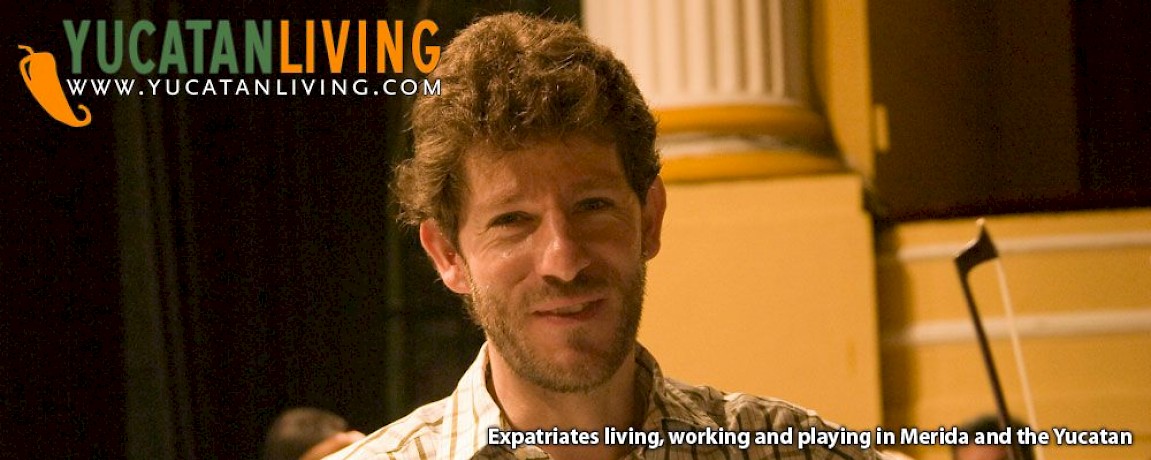


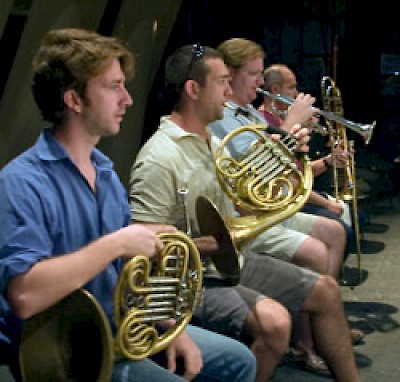
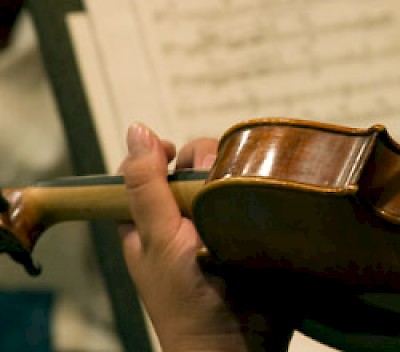
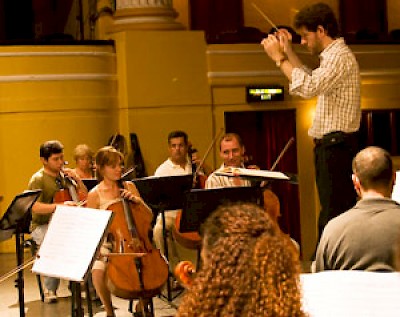
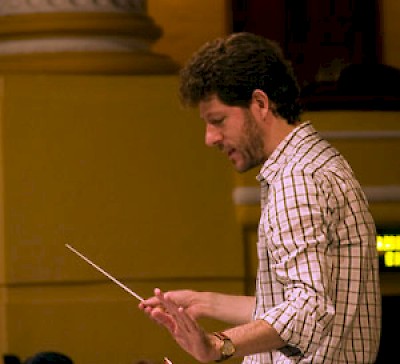
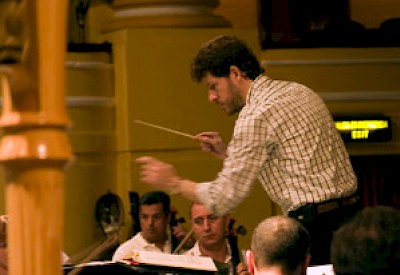
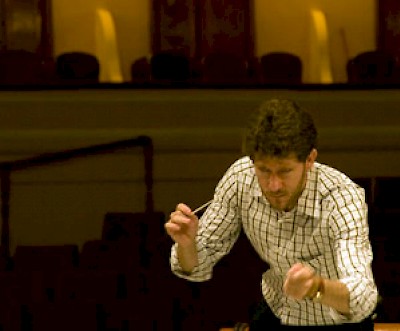
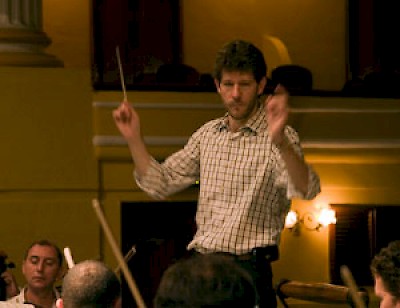
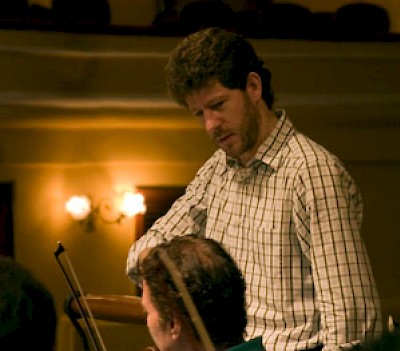
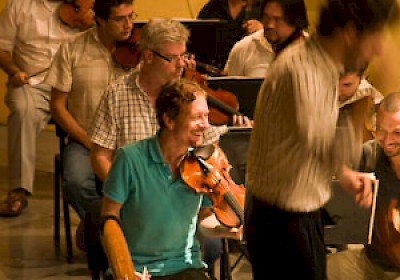

Comments
César Cervera-Rivero 16 years ago
I read your articles everyday. I am originally from Valladolid, Yucatan and now reside in Hollywood, CA. Very interesting and lots of information in your articles. I go to Merida very frequently and always go to as many musical events as I can attend. In Yucatan, music is in the air and in every flower you see. Please keep us informed of all musical events. Again, thank you very much for all the information you provide us. Good, good job!
Reply
Carol Judd 16 years ago
One of the many things I love about Merida is the ability to attend the arts in beautiful surroundings. I love music because it's universal; there is no language barrier with an orcherstra. And having the arts available at such reasonable prices makes it possible to have a rounded experience in the city. Bravo for such a wonderful and exciting article. Your excitement is wonderful.
Reply
anon123 16 years ago
Thank-you for writing such an intelligent and interesting article about the OSY.
Finally someone has taken the time and effort to do a proper and thoughtful interview while getting all the facts correct instead of the usual unimaginative prattle that comes out in the local paper. Bravo for good journalism!
Reply
Working Gringos 16 years ago
We're sorry you couldn't see that performance, but like you, glad that the Symphony has become so popular.
Reply
Nan Logan 16 years ago
We had planned to go to the symphony for the first concert of the season but when we arrived there were no seats left. We were disappointed but pleased for the symphony - and we have already bought our tickets for next Sunday
Reply
Valentina Boeta 16 years ago
This is a very, very, very interesting interview. Congratulations both of you!
Reply
Le V. Bailey 16 years ago
Katalina & YL, i have been in Merida for only 2 weeks and i attended the 11 de Sept performance of Orquesta Sinfonica de Yucatan. It was truly an enormous extraordinary cultural experience for me - incredible! I am a music lover and this event exceeded all my expectations. And thank you and YL for the excellent article and interview with Juan Carlos - it to was an educational experience for me to read. I am BLESSED and happy to be living in Merida. Cheers! Le from Southfield, Michigan USA.
Reply
Benjamin Ramirez 16 years ago
Ellen and Kat, thank you for another wonderful and insightful interview. I hope that your enthusiasm convinces more people to attend all the concerts of our great orchestra. As you correctly pointed out, with a new conductor and organization, the future is very bright.
The Orquesta Sinfonica de Yucatan is a jewel that we all need to cherish, support and enjoy. Benjamin
Reply
Yucatan Living – Juan Carlos and The Symphony | bandinstruments 16 years ago
[...] more from the original source: Yucatan Living - Juan Carlos and The Symphony Tags: carlos, determine-which, merida, merida-yucatan, musical-group, other-members, should-play, [...]
Reply
(0 to 9 comments)